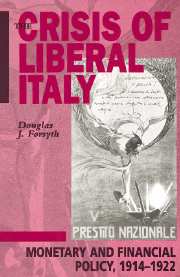Book contents
- Frontmatter
- Contents
- List of figures
- List of tables
- Acknowledgments
- Introduction
- Part 1 Giolittian Italy, 1901–1914
- Part 2 World War I, August 1914–November 1918
- Part 3 The post-war crisis, November 1918–October 1922
- 6 A difficult readjustment: the political economy of the Orlando and Nitti governments, November 1918–June 1920
- 7 From Giolitti to Mussolini: monetary and financial stabilization, and political collapse
- Conclusion
- Appendix: Tables and figures
- Bibliography
- Index
6 - A difficult readjustment: the political economy of the Orlando and Nitti governments, November 1918–June 1920
Published online by Cambridge University Press: 11 December 2009
- Frontmatter
- Contents
- List of figures
- List of tables
- Acknowledgments
- Introduction
- Part 1 Giolittian Italy, 1901–1914
- Part 2 World War I, August 1914–November 1918
- Part 3 The post-war crisis, November 1918–October 1922
- 6 A difficult readjustment: the political economy of the Orlando and Nitti governments, November 1918–June 1920
- 7 From Giolitti to Mussolini: monetary and financial stabilization, and political collapse
- Conclusion
- Appendix: Tables and figures
- Bibliography
- Index
Summary
Much of the shock of readjustment to a peace economy fell on the governments of Orlando (which fell in June 1919), and Nitti (June 1919–June 1920). Above all, Orlando and Nitti had to contend with the cessation of Allied lending and exchange support. The American and British Treasuries discontinued lending to the Allied governments relatively rapidly after the signing of the armistices with the Central Powers in October and November 1918. The United States continued to make advances to Italy and the other European Allies for foodstuffs and certain other commodities through the summer of 1919, while cancelling credits for most other purposes. Britain made a total of £st. 65m. in fresh credits available to Italy for the period after the armistice, of which £st. 5m. was earmarked for use in neutral markets. These credits undoubtedly buffered Italy, as well as France, Belgium and Britain itself, during the period of post-war economic readjustment. Thanks in part to such credits, the Allies were spared the monetary chaos and economic paralysis pervasive in the new and defeated nations of East-Central Europe. However, the post-armistice financial assistance of the British and American Treasuries was insufficient in both amount and time to prevent major disruption in trade and economic activity.
Readjustment was far more difficult in Italy than in France and Belgium, to say nothing of Britain and the United States.
- Type
- Chapter
- Information
- The Crisis of Liberal Italy , pp. 195 - 235Publisher: Cambridge University PressPrint publication year: 1993



